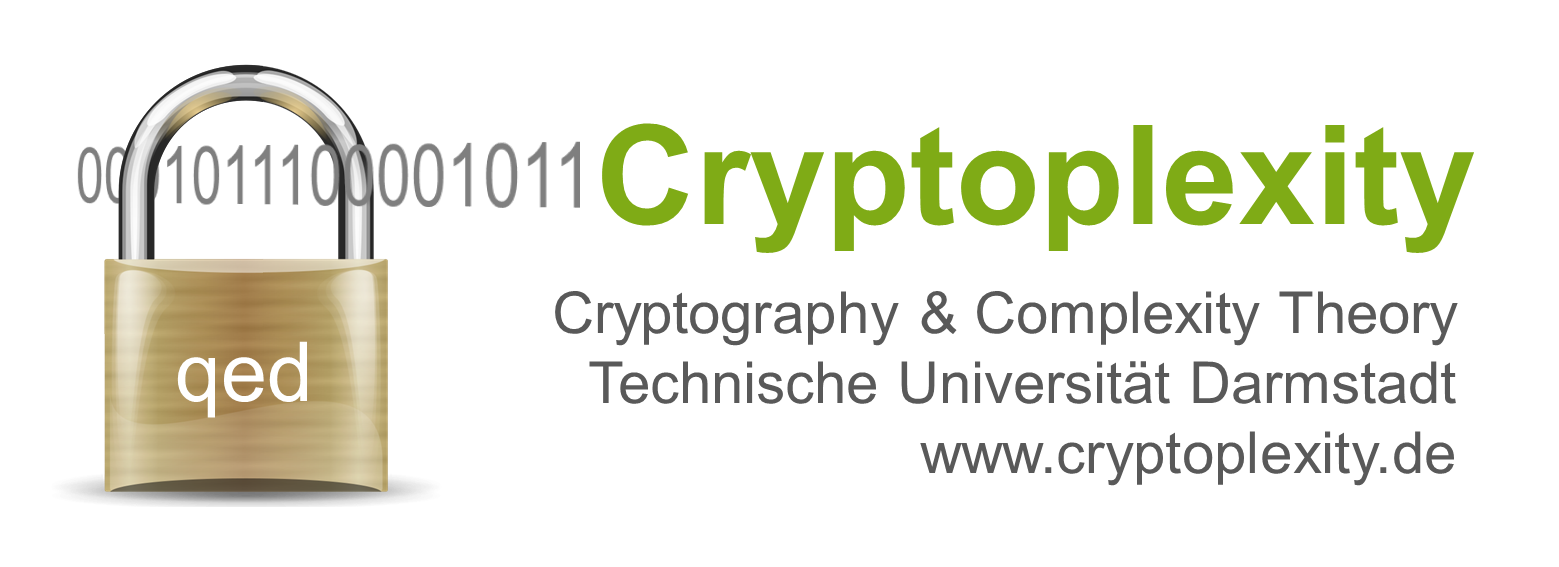Integrierte Vorlesung im Sommersemester 2021
Vorlesungs- und Übungszeiten
| Zeit | Raum | Tutor*in | |
| Vorlesung | Di 13:30-15:10 | virtuell | |
| Übung | Mi 11:40-13:20 | virtuell | Niklas Schwabe |
| Mi 16:15-17:55 | virtuell | Hassan Bin Khalil | |
| Do 13:30-15:10 | virtuell | Hassan Bin Khalil | |
| Sprechstunde | Mo 14:00-15:00 | virtuell | Hassan Bin Khalil |
| Di 10:00-11:00 | virtuell | Niklas Schwabe | |
| Sprechstunde Praktika | nach Vereinbarung | virtuell | Alexander Ziesing |
Veranstaltungsbeschreibung
| Veranstaltungsform | V2 + Ü2 (6 CP) |
| Dozent | Dr.-Ing. Johannes Braun |
| Kontakt | pki@cx.tu-… |
| Beginn |
V: 1. Vorlesungswoche Ü: 2. Vorlesungswoche |
| Voraussetzungen | ./. |
| Anmeldungen | TUCaN |
| Turnus | jedes Sommersemester |
| Unterlagen / Aktuelles |
Vorlesungsskript, Bonusübung, vorlesungsbegleitende Informationen: Moodle Kurs zu PKI |
| Buch zur Vorlesung |
J. Buchmann, E. Karatsiolis, and A. Wiesmaier Introduction to Public Key Infrastructures Springer-Verlag Berlin Heidelberg, 2013. ISBN: 978-3-642-40656-0 (Print) 978-3-642-40657-7 (Online) |
| Diskussionsforum | Moodle Kurs zu PKI |
Inhalt
- Security Goals
- Confidentiality
- Integrity
- Authenticity of Data
- Entity Authentication/Identification
- Non-repudiation
- Availability
- Other Goals
- Public Key Cryptography
- Encryption (symmetric, assymetric, hybrid, cryptosystems, key exchange, performance, security, computational problems)
- Cryptographic Hash Functions
- Message Authentication Codes
- Digital Signatures (performance, standards)
- Certificates
- X.509 Public Key Certificates (properties, content, extensions)
- PGP
- WAP Certificates
- Attribute Certificates
- Trust Models
- Direct Trust (fingerprints, examples of)
- Web of Trust (key legitimacy, owner trust, trusted introducers)
- Use of PGP
- Hierarchical Trust (trusted list, common root, cross-certification, bridge)
- Private Keys
- Software Personal Security Environments (PKCS#12, Java Keystore, application specific )
- Hardware Personal Security Environments (smart cards, hardware security modules, java cards)
- Private Key Life-cycle
- Revocation
- Revocation (reaons for, requirements, criteria)
- Certificate Revocation Lists
- Delta Certificate Revocation Lists
- Other Certificate Revocation Lists (over-issued, indirect, redirect)
- OCSP
- Other Revocation Mechanisms (NOVOMODO)
- Policies
- Certificate Life-cycle
- Certificate Policy and Certification Practice Statement
- Set of Provisions
- Validity Models
- Shell Model
- Modified Shell Model
- Chain Model
- Certification Path Validation
- Trust Center
- Registration Authority (registration protocols, proof-of-possession, extended validation certificates)
- Certification Authority
- Certificate Management Authority
- Certification Paths and Protocols
- Construction
- LDAP and other methods
- SCVP
- Timestamping
- Long Term Archiving Signatures
Literatur
- J. Buchmann, E. Karatsiolis, and A. Wiesmaier. „Introduction to Public Key Infrastructures“, Springer-Verlag Berlin Heidelberg, 2013. ISBN: 978-3-642-40656-0 (Print) 978-3-642-40657-7 (Online)
- J. Buchmann, „Einführung in die Kryptographie“, ISBN 3-540-41283-2
- C. Adams / S. Lloyd, „Understanding Public-Key Infrastructure“, ISBN 1-57870-166-X
- Tom Austin, „PKI / A Wiley Tech Brief“, ISBN 0-471-35380-9
- R. Housley / T. Polk, „Planning for PKI“, ISBN 0-471-39702-4
- A. Nash / W. Duane / C. Joseph/ D. Brink, „PKI Implementing and Managing E-Security“, ISBN 0-007-213123-3
- Henk C.A. van Tilborg, „Encyclopedia of Cryptography and Security“, ISBN-13: 978-0387234731
Qualifikationsziele
Nachdem Studierende die Veranstaltung Public Key Infrastrukturen besucht haben, können sie
- die IT Sicherheitsziele und die kryptographischen Primitive zu deren Realisierung verstehen.
- die Grundlagen von Public Key Infrastrukturen, insbesondere die verschiedenen Komponenten (bspw. private Schlüssel, Zertifikate, Policies), Akteure (bspw. Trust Center, Schlüsselinhaberinhaber) und Prozesse (bspw. Zertifikatsbeantragung, Zertifikatserstellung, Revokation, Zertifikatsvalidierung) verstehen und erklären.
- die zugrundeliegenden theoretischen Modelle (bspw. Vertrauensmodelle, Gültigkeitsmodelle) verstehen, erklären und anwenden.
- Public Key Infrastrukturen in der Praxis anwenden (bspw. für Email Signatur und -Verschlüsselung, Prüfung der Authentizität von Webseiten).


